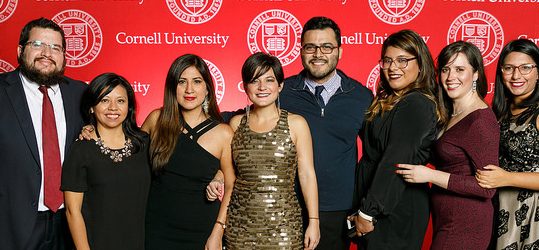Do you have a calling? Or perhaps, just want to meet like-minded folks? In this post, we hear from Anlly Palacios, a first year CIPA fellow focusing on Social Policy who is passionate about leveraging dialogue to address issues that are important to her community. She participates in two clubs, Cornell Latin America Student Society and the Latino/a Graduate Student Coalition. In her own words, Anlly discusses her decision to enrich her time here at CIPA by participating in clubs.
If you are like me, you also decided to start graduate school right after completing undergrad. You told yourself that you would no longer join student clubs or organizations and that your main focus was going to be school and work. However, the student leader in you becomes bored almost instantly, so you crave another responsibility to shoulder. Or maybe you are not like me. Maybe, it has been awhile since you have been back on a very socially-busy campus, and you want to experience something new and fun. Whatever the case, joining a student club is always a positive experience. There is no harm in joining a group of fellow students who are passionate about the same things you are. Student clubs will enrich your time in CIPA, and I am a strong believer that not only will you learn a thing or two, but you will make friendships that will last a lifetime.
Student organizations come in different shapes and sizes. Upon starting the MPA program, you will become familiar with the several CIPA-affiliated clubs and organizations, which are; Cornell Public Affairs Society (CPAS), Cornell Latin America Student Society (CLASS), Women in Public Policy (WIPP), and the Cornell Policy Review (CPR). As CIPA students, we automatically become general members of CPAS, the liaison student group between fellows and administration. These clubs hold events and workshops, which are often times free of charge and open to both CIPA and Cornell students alike. With so many clubs, there is always something to do every week. If you want a little more responsibility or to get more experience in project management, becoming a board member of one of these clubs can be the ideal step for you. Elections are held towards the end of the Fall semester, and the results are announced at the CIPA Gala in November. The term for a board member is one academic year.
Aside from the CIPA-affiliated groups, Fellows can also join other graduate student clubs that are open to the entire graduate community. One club that I am personally part of is the Latino/a Graduate Student Coalition (LGSC). As the Co-Chair, many of the tasks I deal with consists of delegating and executing the planning activities for our general body meetings and student events. I am also the Director of Membership and Events of CLASS. Partaking in these roles simultaneously can be an overwhelming experience, but I think it is worth my time and effort because I strongly identify with what each of these clubs are attempting to achieve. So, the key to balancing your student involvement is making sure you are investing your energy in a club that peaks your interest and is aligned with your future goals and career.
For more information on CIPA-Affiliated clubs or Cornell student clubs, please visit the following websites:
CIPA-clubs: http://www.cipa.cornell.edu/studentlife/
Cornell Clubs: http://www.orgsync.rso.cornell.edu/Search

